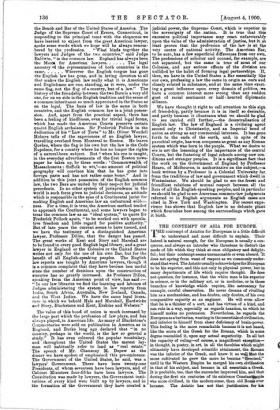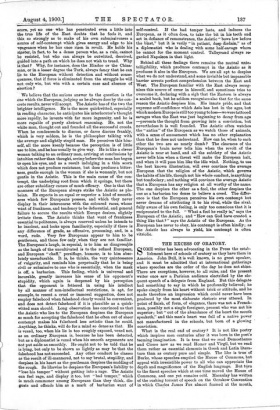THE CONTEMPT OF ASIA FOR EUROPE.
THE contempt of Asiatics for Europeans is a little difficult I- to understand and most difficult to explain. Their hatred is natural enough, for the European is usually a con- queror, and always an intruder who threatens to disturb the mode of life which they think at once obligatory and delight- ful; but their contempt seems unreasonable or even absurd. 'It does not spring from want of respect as we commonly under- stand that word. The Asiatic usually acknowledges the European to be his superior, and this not only in physical power, but in many departments of life which require thought. He does not question, for instance, that the white mail is his superior in science, or in the military art, or in medicine, or in those branches of knowledge which require, like astronomy for example, careful observation. He never dreams of rivalling him as a mechanician, and has doubts, only doubts, of his own comparative capacity as an engineer. He will even allow that he is a thinker of a sort; and has virtues of a kind, and can rule in a way, especially as regards taxation, to which he himself makes no pretension. Nevertheless, he regards the European as abarbaiian, wanting in the essentials of civilisation, and inferior to himself from sheer deficiency of brain-power. This feeling is the more remarkable because it is not based, like the scorn of the Greek for the Roman, which in some degree resembled it, upon any actual superiority. In all but the capacity of ruling—of course, a magnificent exception— in thought, in poetry, in art, in all the faculties which might ultimately have developed scientific attainment, the Roman was the inferior of the Greek, and knew it so well that the more cultivated he grew the more he became " Grecised." until in the Western Empire he merged his own civilisation in that of his subject, and became in all essentials a Greelr. It is probable, too, that the surrender improved him, and that during the first six centuries of its existence Constantjpople vies more civilised, in the modern sense, than old Rom:0 ever became. The Asiatic has not that justification for his
scorn, yet no one who has penetrated even a little into the true life of the East doubts that be feels it, and this so strongly as to make of his own submissiveness a source of self-contempt which gives energy and edge to his vengeance when he has once riaen in revolt. He holds his master, in fact, to be a dense person who, as a rule, cannot be resisted, but who can always be outwitted, deceived, guided into a path on which he does not wish to tread. Why that? Why, for instance, does the Hindoo or the China- man, or in a lesser degree the Turk, always fancy that he can lie to the European without detection and without conse- quences, that if force is eliminated from the struggle he will not only win, but win with a certain ease and absence of ' exertion?
We believe that the serious answer to the question is the one which the European, judging as he always does by the con- crete results, never will accept. The Asiatic has of the two the brighter intelligence. He is the more quickwitted, especially in reading character, he anticipates his interlocutor's thought more rapidly, he invents with far more ingenuity, and he is more capable of purely abstract reasoning. He, not the white man, thought out and founded all the successful creeds. When he condescends to discuss, or dares discuss frankly, which is very seldom, he is the philosopher talking with the average and slightly stupid man. He perceives this him- self, all the more keenly because the perception is of little use to him, and he has usually to give way. He is like a clever woman talking to an ordinsry man, arriving at conclusions by intuition rather than thought, seeing before the man has begun to open his eyes, and as a result indulging in a thin scorn which does not produce resistance, but does produce a bitter- ness, gentle enough in the woman if she is womanly, but not gentle in the Asiatic. This is the main cause of the con- tempt, the underlying root from which it springs, but there are other subsidiary causes of much efficacy. One is that the manners of the European always strike the Asiatic as ple- beian. He expects in an equal or superior a kind of smooth- ness which few Europeans possess, and which they never display in their intercourse with the coloured races, whose want of frankness, and tendency to be deferential, and general failure to secure the results which Europe desires, slightly irritate them. The Asiatic thinks that want of frankness essential to politeness, is always reserved unless he intends to be insolent, and looks upon familiarity, especially if there is any difference of grade, as offensive, presuming, and, in a word, rude. Very few Europeans appear to him to be gentlemen, and those few only ,when they are not familiar. The European's laugh, in especial, is to him as disagreeable as the laugh of the uncultivated is to the refined European, and European "chaff," persiflage, humour, is to him abso- lutely unendurable. It is, he thinks, the very quintessence of vulgarity, and reminds him perpetually that he is being civil or submissive to one who is essentially, when the mask is. off, a barbarian. This feeling, which is universal and incurable, greatly increases his sense of his opponent's stupidity, which again is deepened by his perception that the opponent is fettered in using his intellect by all manner of non-intellectual restrictions, is apt, for example, to resent a cruel or immoral suggestion, does not employ falsehood when falsehood clearly would be convenient, and does not detect falsehood if it is plausible as a quick- witted man should. Long observation has convinced us that the Asiatic who lies to the European despises the European so much for accepting the falsehood that he often out of sheer contempt makes his falsehood less artistic than he could. Anything, he thinks, will do for a mind so dense as that. He is vexed, too, when his lie is too roughly exposed, vexed not, as an ordinary European is, because he has been detected, but as a diplomatist is vexed when his smooth arguments are not put aside as smoothly. He ought not to be told that he is lying, but only to be shown as lightly as may be that the falsehood has not succeeded. Any other conduct he classes as the result of ill-mannered, not to say brutal, stupidity, and despises in his heart as the gentleman despises the scolding of the rough. So likewise he despises the European's liability to "lose his temper" without getting into a rage. The Asiatic can feel rage, and display it too, but "bad temper," which is much commoner among Europeans than they think, dis- gusts and offends him as a mark of barbarian want of self-control. If the bad temper lasts, and induces the European, as it often does, to take the bit in his teeth and act in defiance of remonstrance, the Asiatic "bows low before the blast," but it is verily "in patient, deep disdain," as of a diplomatist who is dealing with some half-savage whom he cannot for the moment control. Talleyrand always re- garded Napoleon in that light.
Behind all these feelings there remains the mutual win- telligibility, which produces contempt in th,e Asiatic as it produces it also in the European. We are all apt to despise what we do not understand, and some invisible but impassable barrier arrests perfect comprehension between the East and West. The European familiar with the East always recog- nises this source of error in himself, and sometimes tries to overcome it, declaring with a sigh that the Eastern is always a sealed book, but he seldom recognises also that for the same reason the Asiatic despises him. His innate pride, and that supreme self-confidence which Asia has lost in the ages, but which modern Europe is still too young to lose—we were tattooed savages when the East was just beginning to decay from age —prevents the thought from growing into a conviction, but nevertheless it is well founded. The Asiatic often watches the " antics " of the European as we watch those of animals, with a sense of amusement which has no other explanation than that he does not understand. How can he, when to each other the two are so nearly dumb? The clearness of the European's brain never tells him when the revolt of the Asiatic is near at hand, and all the subtlety of the Asiatic never tells him when a threat will make the European halt, and when it will pass him like the idle wind. Nothing, to use the best known illustration, will ever convince the average European that the religion of the Asiatic, which governs the habits of his life, though not his whole conduct, is anything but tomfoolery; and nothing will convince the average Asiatic that a European has any religion at all worthy of the name. The one despises the other as a fool, the other despises the one as a barbarian too dense to believe a creed. The differ- ence is that the European perceives his own contempt but never dreams of attributing it to his rival, while the rival, fully aware of his own feeling, is only too conscious that it is reciprocated to the full. "What a fool he really is," says the European of the Asiatic; and "How can God have created. a thing like that ? " says the Asiatic of the European. As the European has never to obey, his contempt is often kindly; as the Asiatic has always to yield, his contempt is often vitriolic.



































 Previous page
Previous page